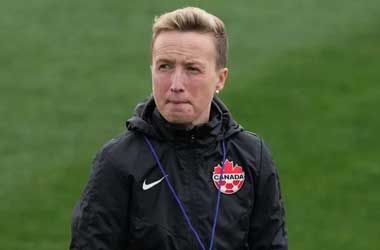Head Coach Priestman Is Out Amid Drone Spying Investigation

Summary:
- Head coach Bev Priestman, assistant coach Jasmine Mander, and analyst Joey Lombardi will not return to Canada’s women’s soccer team.
- The decision follows a one-year FIFA suspension for a pre-2024 Olympics drone-spying scandal.
- The investigation revealed a problematic culture within Canada Soccer.
The investigation into the Olympic drone-spying incident involving the Canadian women’s soccer coaching staff raises a large number of questions and answers.
Yet, it clearly indicates that “the practice of conducting surreptitious surveillance of opponents” began before the 2024 Paris Olympics.
As a result, Canada Soccer announced that head coach Bev Priestman, assistant coach Jasmine Mander, and analyst Joey Lombardi would not return.
All three are currently serving a one-year FIFA suspension for their roles.
“The three individuals currently suspended by FIFA will not be returning“, Canada Soccer confirmed, adding that the search for a new women’s national team head coach would soon begin.
Lombardi resigned after the Olympics, while the status of Priestman and Mander is still under review.
“A Symptom of a Difficult and Unacceptable Past Culture”
Canada Soccer’s leadership, CEO and general secretary Kevin Blue and president and board chair Peter Augruso, highlighted a troubled past culture within the national teams:
The findings of the independent investigator reveal that the incident itself was a symptom of a difficult and unacceptable past culture within the national teams.
Their statement added that
While players on the national teams performed admirably, cultural standards and management of the programs dating back several years fell short of expectations.
The investigation remains incomplete, as former coach John Herdman has yet to provide evidence. Canada Soccer has initiated disciplinary proceedings regarding Herdman under the Disciplinary Code.
Culture of Silence
Canada Soccer has initiated a disciplinary process regarding potential violations of its Code of Conduct and Ethics.
The independent report, conducted by Sonia Regenbogen from Mathews, Dinsdale & Clark, suggests that internal resistance existed regarding the drone use in Paris, with some staff expressing discomfort but feeling unable to challenge the head coach. Canada Soccers’ statement said:
Some assistant coaches and staff members felt uncomfortable with the practice of spying on opponents but did not feel they could challenge the authority of the head coach.
This culture of silence contributed to a lack of accountability.
Canada Soccer is now introducing new measures to prevent similar incidents, including mandatory ethics training, reporting protocols, and the formation of an independent Audit and Compliance Committee.
Although many hoped for full transparency, Canada Soccer did not release the entire report. Instead, a heavily redacted 36-point summary was made public.
The investigation found that Canadian players were unaware of the footage obtained at the Olympics.
Additionally, a similar incident at Copa America in June led to Canada Soccer being fined after a drone incident, though the organization maintained the filming was for promotional purposes.
The Paris controversy emerged after New Zealand’s Olympic Committee lodged a complaint with the IOC about drone activity during pre-tournament training sessions.
This led to the immediate suspension and removal of Mander, Lombardi, and later Priestman. FIFA ultimately banned the trio for one year for “offensive behavior and violation of the principles of fair play.”
Canada was penalized six points in the Olympic tournament and fined 200,000 Swiss francs (CA$316,000).
Canada Soccer has pledged to restore public trust, sharing the report’s findings with FIFA and committing to more rigorous ethical standards moving forward.
